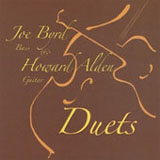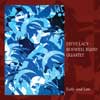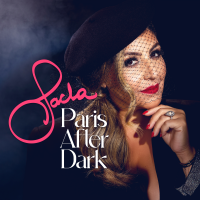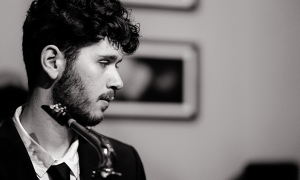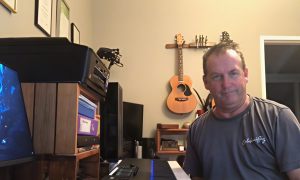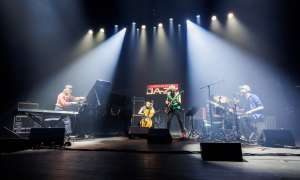Home » Jazz Articles » Take Five With... » Take Five With Craig Pilo
Take Five With Craig Pilo
In May of 2007 Craig released his first solo cd titled "Just Play". Just Play is a Jazz fusion CD, enhanced and interactive with live video footage, featuring a Fender Rhodes rhythm section, and a few notable guests, including: Mitchel Forman, Tom Kennedy, Ed Czach, David Enos, and Roman Dudok, to name a few. Just Play can now be heard on a growing number of terrestrial and internet radio stations. It has been reviewed favorably and nominated for two Los Angeles Music Awards.
Your teaching approach: Teaching has kind of come and gone for me over the years since my first priority has always been to play. I imagine that priority will shift a little once the touring lightens up for me. I currently have 3 students that cooperate with my schedule, so it's not as regular as we'd like, but it's the best I can do right now. When I was teaching a lot (I've taught in schools and privately since I actually have a degree in music from North Texas) I've always tried to cover a lot of territory.
Teaching is tough because from a drumming stand point there is a tremendous amount of information that's all pretty vital. There are rudiments, reading, interpretations, listening, dynamics, time studies, history, styles, so on and so fourth. There's really a lifetime of material. I have a few file cabinets full of textbooks that I've worked through, but even with all of those, I've honestly just scratched the surface. There are even more on my "to do list. That being said, when was the last time learning anything in a textbook was all a student needed to go out and get a gig? There is so much more to it than reading from a book. I try to make it fun for my students (I've had all ages), the worst thing would be to bore them to death. There's so much to learn it's usually pretty easy to change gears if something isn't sinking in.
I try to assess a student's goals before we get into any specific avenue. In other words, sight reading isn't a high priority for a business man that has always wanted to play drums and is studying with me to get good enough to jam with some co workers. In another situation, a high school student trying to get into music school really needs a firm lesson each week, a pretty strict routine, and lots of reading. Reasonable goals keep both of us motivated to succeed.
I've had some really great students over the years. Most stay with me for a lengthy period of time (my newest student has been with me about 6 years). I screen them (and sometimes the parents) before I get in too deep. It's really created a positive learning environment for both of us. We all start with establishing some basic fundamentals, from that point on, all I ask is that they take it seriously and practice. I try to fuse what my teachers shared with me (Alan Dawson, Ed Soph, Dave Weckl, Jeff Hamilton and most recently Aaron Serfaty) and what I've learned from my career as a professional.
From time to time scheduling is an issue for everyone, but drum lessons need to be important if you want results. I expect a certain amount of commitment and respect for drum lessons, it needs to be somewhat of a priority to get the desired results.
Then there are musicians that teach "for some extra cash or to "supplement my gigging income. All that is well and fine as long as those aren't the ONLY reasons they teach. For the record, I've never taught solely for the money. The money is merely a small compensation for my time and to make a student take drum lessons seriously. Nobody takes anything seriously if it is free or inexpensive. Someone who pays more for a drum lesson is far more likely to practice and get their moneys worth.
What do you think is the most important thing you are contributing musically? Here's a secret, I'm not that good of a straight ahead jazz drummer, so I really have no choice but to bring something different to the table. I kind of fuse my jazz playing with grooves and styles that I've taken from other players, formats, and situations. I play jazz drums on jazz gigs, that's about the only thing I have in common with guys that play really well. I think it's important sonically to get as close as I can because that's what seems to fit best, but my playing and groove kind of force the jazz police to think a little left or right of what they're used to. I'm hoping Angela Carole Brown's upcoming CD "Expressionism will help illustrate my point a little better than I've done here.
On my CD "Just Play I took several tunes in a different direction in an effort to make more of a contribution. It was nothing earth shaking or revolutionary, but it definitely ruffled some feathers among my Latin friends and straight ahead friends Perfect! Mission Accomplished.
How would you describe the state of jazz today? Well, would I be stating the obvious if I said I thought it was in trouble? Here's the thing, from a musician stand point there is no shortage of great players today. There's also no shortage of really great music by both well knowns and unknowns. I think there is a tremendous shortage of innovation and people thinking outside the box. With very few exceptions, most musicians are all playing stuff that's been done before. So from that aspect, it doesn't matter whether it's good, it only matters that it's been done. Same music, different band. There are plenty of notes left and there is good music yet to be made, where is it? I don't think this applies specifically to jazz either, I think it applies to all styles.
On the public side (non musician) I think music in general is in trouble. I read forums all the time with "claim to be authorities telling us everything we're doing wrong and why things are the way they are. The truth is nobody really knows where this lack of interest in music has come from. I'm dumbfounded that people in general would rather have 5,000 songs in an over compressed format on their ipod rather than a 5 or 6.1 surround mix of 1 good performance on their DVD player. Do I have an ipod? Sure I do, I use it on planes and at the gym, it's a practical thing, but my point is the public seems to be into high volumes of mediocrity rather than low volumes of quality. I don't have an answer why the state of jazz (or music for that matter) is the way it is, but I have a few observations/opinions that I'm happy to share.
1) Jazz caters to an intelligent and specific listening market. It's always been tough to sell.
2) The public seems to only like, listen to, and purchase what they've heard before. They don't like new things.
3) Unfortunately, image matters. Nothing wrong with marketing in any way shape or form, but if you take away a picture, image, or video and all you have left is the sound, how many artists would be left standing?
4) Smooth Jazz. The only good thing it's done is make a small portion of jazz accessible to the general public. I like some of it, but most I find quite unlistenable. The pattern seems to be fantastic players playing over simplified music. Some of the most quantized recordings in this category are extremely offensive.
5) See my answer to the next question.
What are some of the essential requirements to keep jazz alive and growing? Education. Take this however it fits. If it means educating children starting in elementary school, than we need to start doing it. If it means educating the general public on how to appreciate jazz, than we need to start doing it. If it means supporting our local jazz clubs and festivals, than we need to start doing it. We need to educate anyone willing to listen to the importance of keeping this art form alive and thriving.
The easiest thing to do would be to pass the blame or make a ridiculous, authoritative analogy stating the obvious. The hard thing to do is take some responsibility and go out and support live jazz. If you are a jazz musician, don't be selfish, get out and support your friends a few nights a month. If you're an enthusiast, go out and check out some live jazz by some unknowns a few times a month who knows, you might see something you like. One thing is for sure, if we all don't start showing some support, we won't have to worry about it much longer. I NEVER side with club owners, but how much of a beating would you take booking jazz in your club if night after night, nobody came to see it?
What is in the near future? Currently, I'm touring with Frankie Valli. I was touring with both Frankie Valli and Edgar Winter earlier in the year, but Frankie is getting quite busy and Edgar understandably needed the same drummer for all of his gigs. I play with a couple really great singers here in LA when I'm not on the road. First and foremost, Angela Carole Brown. She's awesome, a true artist. and I highly recommend going out and supporting ALL of her efforts. She has books, art, and 2 original groups—1 jazz and 1 folk. We are in the middle of her second jazz CD featuring her Slow Club Quartet. This CD is really going to be great, I can't tell you how excited I am about the way it's sounding. With any luck, it will be out in time for Christmas or first thing next year.
Tags
PREVIOUS / NEXT
Support All About Jazz
 All About Jazz has been a pillar of jazz since 1995, championing it as an art form and, more importantly, supporting the musicians who make it. Our enduring commitment has made "AAJ" one of the most culturally important websites of its kind, read by hundreds of thousands of fans, musicians and industry figures every month.
All About Jazz has been a pillar of jazz since 1995, championing it as an art form and, more importantly, supporting the musicians who make it. Our enduring commitment has made "AAJ" one of the most culturally important websites of its kind, read by hundreds of thousands of fans, musicians and industry figures every month.



